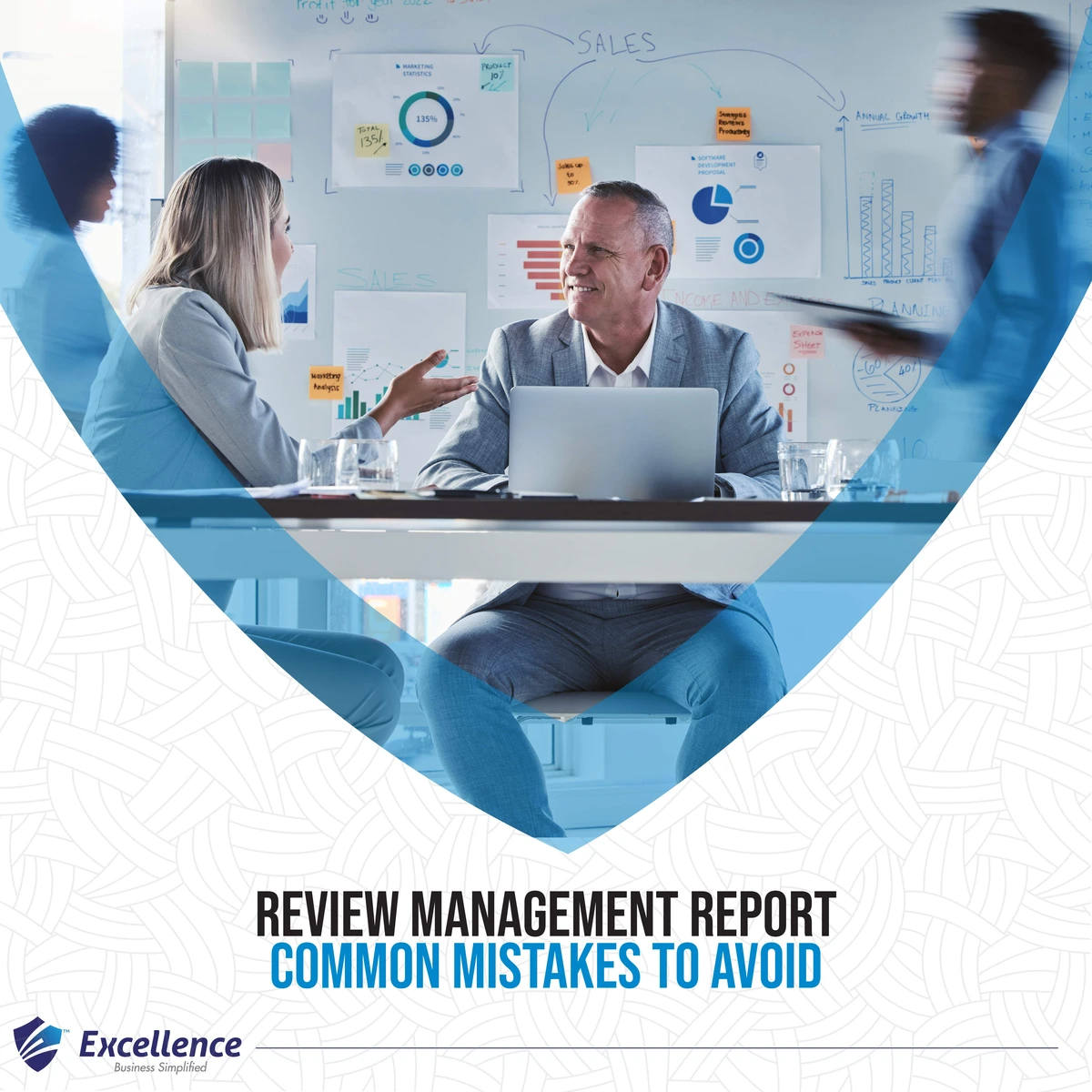Review Management Report – Common Mistakes to Avoid

In today’s fast-paced, high-growth economy – especially in thriving countries like the United Arab Emirates, success is not just about opening a business venture with a good idea. It is also knowing how your business is actually performing and will perform: financially, operationally, and strategically. That’s where resources/documents like the Review Management Report come in.In this comprehensive blog, we’ll delve deep into what a Review Management Report entails, the importance of getting it right, how it differs from a Special Purpose Audit Report, and the most common mistakes to avoid when preparing or evaluating one.
What is a Review Management Report?
A Review Management Report is a document that evaluates the business’s financial or operational activities over a given period. It is not a full audit. Instead, it gives limited assurance, a tool to identify material misstatements and financial problems that may affect business performance or reporting.
This is the report most commonly used by the management, stakeholders, or board of directors to either evaluate the performance of the company, pinpoint anomalies, see red flags, and then make sound and informed strategic decisions to rectify it. The silver lining to it is that it is less invasive than an audit, requires fewer resources, yet remains accurate, objective, and trustworthy.
The Role of the Review Management Report in Business Strategy
Organizations depend heavily on the insights gleaned from Review Management Reports to:
- Monitor operational efficiency
- Identify risks or inefficiencies
- Validate strategic goals
- Offer not only financial forecasting but also budgeting guidance
- Ensure that the business is always adhering to Regulatory Compliance and any Internal Controls
Review Management Reports influence high-level decisions, making it important to note that any inaccuracies or inconsistencies in such can have serious consequences – both financially and reputationally. It’s like when you are presented with a full body scan, you rely on the results for you to know what areas you need to improve on: you purchase the right medicine to ensure that gaps are healed. But imagine if your report is false – then not only are you putting your efforts into waste but you are also putting everything else into jeopardy.
Even without finance knowledge, you can get value from a Review Management Report by looking at things like:
- Are sales going up or down?
- Is the company spending more than it earns?
- Which products or regions are performing best or worst?
- Are targets being met on time?
- What does management recommend doing next?
How is a Review Management Report Different from a Special Purpose Audit Report?
| Similarities | |||
| |||
| Differences | |||
| Review Management Report | Special Purpose Audit Report | ||
| 1. | Generally used internally or shared with stakeholders to monitor performance and make decisions. | 1. | Tailored for particular users (e.g., regulatory authorities, lenders) and for specific external purpose such as applying for a loan, meeting a legal requirement, or showing results to investors. |
| 2. | Provides limited assurance, focuses on trends, summaries, and review of key areas only. | 2. | Provides reasonable assurance based on a specific audit objective, includes testing of transactions, account balances, and supporting documents. |
| 3. | Less detailed testing than a full audit; Provides limited assurance – it checks for obvious errors or issues, but doesn’t deeply test everything. | 3. | Involves in-depth testing and sampling. |
| 4. | Faster and cheaper compared to an audit report – because it requires less work and investigation. | 4. | Takes more time and is costlier, since it involves deeper analysis and formal reporting. |
The key difference is the level of assurance and the intended audience. A Special Purpose Audit Report is highly focused, often legally required, and designed for external verification, whereas a Review Management Report is more about internal governance and performance evaluation.
Integrating Review Management Reports with Special Purpose Audit Reports
In some scenarios, both types of reports are required – for example, a company preparing for a loan application may submit a Special Purpose Audit Report to satisfy lender requirements while using a Review Management Report internally to track financial trends and risk exposure.
To enhance effectiveness:
- Ensure consistency in data sources and findings across both reports.
- Cross-reference insights where applicable.
- Treat them as complementary tools – one offering limited assurance for internal management and the other offering higher assurance for external compliance or third-party validation.
Common Mistakes in Review Management Reports
Now that we understand the significance of a Review Management Report, let’s look at some common mistakes to avoid during preparation, analysis, or review.
1. Inadequate Scope Definition
One of the most frequent errors is failing to clearly define the scope of the review. There are times when we just want to look at everything at once, but as the saying sometimes goes, “a jack of all trades is a master of none,” which also correlates that most times when we include too much unnecessary detail, then we really lose sight of what really matters. An ambiguous scope can lead to incomplete reviews or irrelevant data being included, which affects decision-making.
| Avoid it by: | Key Point: |
|
Focus only on what affects business decisions and what you really need to look at the moment — check if it’s: sales trends, big expenses, or performance problems. |
2. Lack of Standardized Format Mistakes happen when Review Management Reports lack consistency in structure, format, or terminology. Writing review management reports that are not structured properly will only lead to confusion, misinterpretation. And difficulty in comparing reports over time. so what is the use of the same in the long run?
| Avoid it by: | Key Point: |
|
Use standardized professional language and charts to explain things clearly or better, tap professional accounting companies who know how to do reports right. |
4. Insufficient Data Validation Don’t rely on raw data without thorough validation or reconciliation. It’s never supposed to be guesswork when it comes to financial reporting – especially with your review management report. Using wrong or outdated numbers without insufficient data validation will only lead to incorrect conclusions, which in turn lead to poor strategic decisions and bad business decision.
| Avoid it by: | Key Point: |
|
Double-check numbers with accounting standards or operations before the report is finalized. |
5. Not Addressing Previous Findings Ignoring findings or recommendations from prior Review Management Reports is a mistake. It’s as if you have identified the problems, but what is next? Reports are not there to be a souvenir. Failing to address the issue will result in repeated mistakes and a lack of progress, indicating weak internal controls and accountability.
| Avoid it by: | Key Point: |
|
Highlighting whether issues have been resolved, are in progress, or remain unaddressed is important – and those unaddressed concerns should have actions taken forward. The business may have changed, so old reports might be misleading – remember to always update the report with current facts, even if the structure stays the same. |
6. Disregarding Any Regulatory Compliance
Failing to align the report with relevant laws, regulations, or accounting standards shouldn’t happen as this not only exposes the organization to financial risk but also legal risk.
| Avoid it by: | Key Point: |
|
Always ensure that the review management report follows applicable frameworks (IFRS, ISA, GAAP, local tax codes). |
7. Delayed Reporting One core mistake is producing reports too late to be relevant. The value of a Review Management Report is diminished when decisions have already been made.
| Avoid it by: | Key Point: |
|
Ensure that the accounting company you engage with Review Management report knows their ways, ensuring responsibility and professionalism in doing and submitting reports. |
Tips for Creating High-Quality Review Management Reports
- One important tip is to use reliable financial reporting tools that can automate and standardize data/information input – allowing you to save time and mitigate errors.
- Put/Document your review process in writing to be transparent and consistent and it would be a plus to use business intelligence (BI) platforms for advanced analytics and proper data visualization.
- Engage professional accounting companies offering full-service management accounting services.
- Conduct regular peer reviews or third-party reviews for quality assurance.
Looking to revamp your Review Management Reportprocess or need guidance on preparing for a Special Purpose Audit Report?
Reach out to our team of qualified financial advisors, accountants, and auditors with experience in internal control, compliance, and business performance analysis.
At Excellence, we’re more than financial experts — we’re your partners in clarity and confidence. We make sure you’re never lost or scared to ask a question, no matter your background. If you’re in control or making critical decisions, you ought to be able to fully understand your financials — and we’re here to make it simple.
With Excellence, you don’t merely get reports — you get the support to understand them. We simplify your business so that you can focus on what matters most – growing your business.



